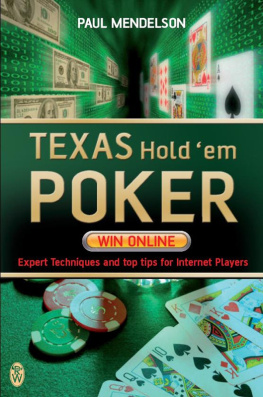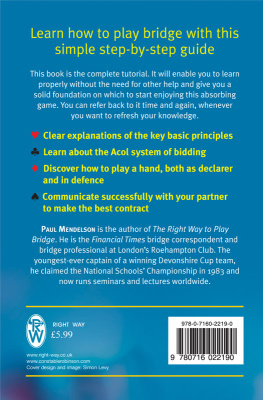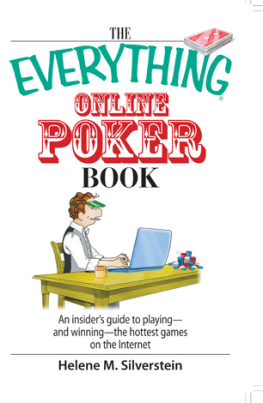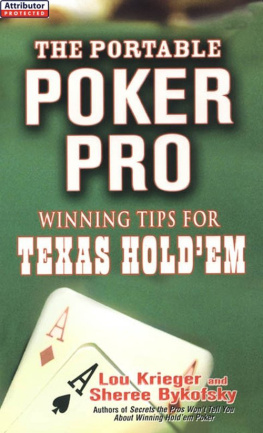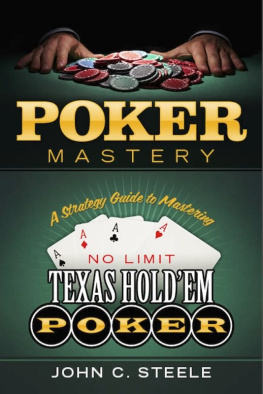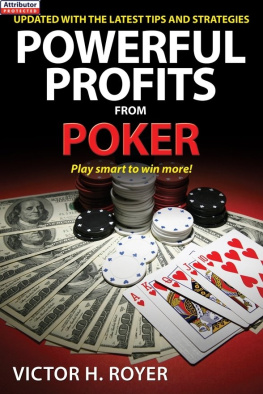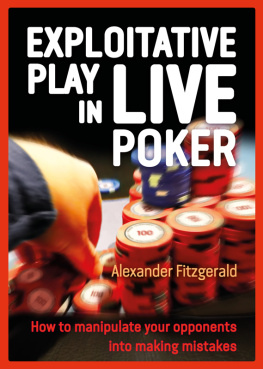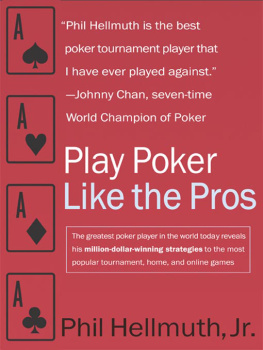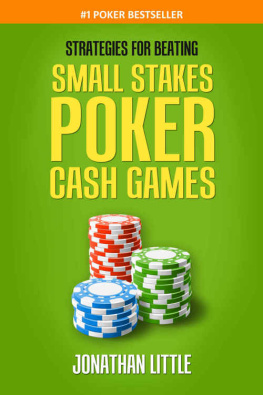TEXAS HOLD EM POKER
By the same author
Texas Hold Em Poker: Begin and Win
Bridge for Complete Beginners
The Right Way to Play Bridge
Control the Bidding
Uniform with this book
TEXAS
HOLD EM
POKER
WIN ONLINE
Paul Mendelson
Constable & Robinson Ltd
5556 Russell Square
London WC1B 4HP
www.constablerobinson.com
This edition published by Right Way,
an imprint of Constable & Robinson, 2007
Copyright Paul Mendelson, 2007
The right of Paul Mendelson to be identified as the author of this work has been asserted by him in accordance with the Copyright, Designs & Patents Act 1988.
All rights reserved. This book is sold subject to the condition that it shall not, by way of trade or otherwise, be lent, re-sold, hired out or otherwise circulated in any form of binding or cover other than that in which it is published and without a similar condition including this condition being imposed on the subsequent purchaser.
A copy of the British Library Cataloguing in Publication Data is available from the British Library
ISBN: 978-0-7160-2186-5
eISBN: 978-0-7160-2251-0
Printed and bound in the EU
1 3 5 7 9 10 8 6 4 2
CONTENTS
INTRODUCTION
This is a book for poker players, experienced or comparatively new, who want to win playing online poker. It assumes some basic knowledge of the game, even if that has been gleaned only from modest home games and watching poker on television.
It also assumes that you are computer savvy or you know someone who is: you have email, you use the Internet, perhaps you shop online. If you are, online poker will be easy for you. Although the game on which this book focuses is No-Limit Texas Hold Em since its the variation which is most widely played online, and still continues to grow in popularity worldwide much of the guidance applies equally to other versions of the game.
Playing poker online is quick and simple; it is far less personally threatening than a live game. It is easier to rebuy chips, easier to cope with being shown a bluff, not really embarrassing if you make a foolish mistake. This is all positive, but it does lead to a certain looseness in the styles of most new or inexperienced online players. Ultimately, looseness leads to losses and that is why, for the expert, disciplined player, online poker is easier to beat than the live game.
Most significantly, it is easier to call online than in a live game. The mere act of clicking a button is so much easier than pushing forward a stack of chips and having to muck your cards when you see youve been beaten. Online, everything can happen smoothly and almost painlessly. Your opponents superior cards are revealed; your cards get mucked, probably automatically. The blinds for the next hand are placed and the cards dealt even before anyone has had any time to react.
This tendency towards easy calling is a huge slippage from which many online players suffer. You want to eliminate such slippage yourself and watch your opponents slippage heading in your direction!
Your assessment and knowledge of the players at your tables will be paramount, leading, as it will, to your table selection and the game in which you will pitch yourself.
I suspect that the majority of readers will already be playing online. For you, skip . Before you do, however, you face a challenge: acknowledging that you are not doing as well as you should. Are you prepared to take a few steps backwards in order to learn the basics thoroughly?
To win online and win steadily is a simple skill to appreciate, but far harder to master and apply consistently. Whilst there are certainly hundreds of thousands, if not millions, of poor poker players online, exploiting your skill to record consistent profits is far harder than many imagine. Many experts think that as few as 5 per cent of online players make money from playing. That so few should be doing well is startling enough, but think more deeply and you will realise that this signifies that 95 per cent of players are winning very little, roughly breaking even (and breaking even doesnt really exist, except in the gamblers imagination) or losing. That last category is the one in which the vast majority of online players find themselves, even if only a small proportion actually admit it to themselves. Self-knowledge, as we will see, is a vital component of poker success, perhaps especially when playing online.
If you class yourself as an average, or just above average, player, then the chances are that you are actually losing, or winning only a little. This book will show you how to become truly above average and to record steady online winnings.
The good news for you, as a player wanting to improve as we all should be is that the online game is full of players with no interest in improving, and very little ability and Im talking a breathtaking lack of ability. To part them from their bankrolls, however, can sometimes prove more difficult than it might at first appear. There is a considerable medium- to long-term luck factor in Texas Hold Em, and loose games can often result in horrendous bad beats and frustrating sessions as players appear almost to gang up on you. To succeed, you require discernment in table choice, strategies and playing styles to counter each type of poker environment you find yourself inhabiting. This is what this book is about.
Your success at poker should not be based on how many pots you win, nor how much money you are winning. It is a game about decisions, and your level of ability (and, usually, your prosperity) will depend on how often you make the right decision, and avoid costly wrong decisions. Whilst much of the traditional psychology and tell-reading which makes the live game so fascinating, both to play and to observe, is missing from online poker, there are plenty of additional methods to discern what your opponents may be holding. The ability to provide false information and deduce accurate readings of your opponents is among the most important elements of online play.
Before we move on to the advice and information, you need to ask yourself some serious questions, the most important of which is this: do I really want to win money playing online poker?
Well, obviously!
Yet the vast majority of players demonstrate all the attributes of players who are determined not to be in profit at the end of the year. They dont do basic homework or preparation; they play when mentally, and sometimes physically, unfit; for the fun of it the glamour, the excitement, the short-term adrenalin rush. They play to pass the time and escape the pressures of the real world. Poker seems like gambling where your skill can give you the edge, but theres no desire to hone those skills. These are perfectly good reasons to play poker it is a game, after all, but, if you want to win, then to do so requires a little work.
Are you prepared for some gentle study? Are you happy to serve your apprenticeship? Can you take notes and keep records, not only of your opponents actions but your own? Can you make those notes honestly? Can you concentrate hard for short periods? These are things a true card player can manage easily. The result will be that you will enjoy your poker more, and you will win money. So, ask yourself: do I really want to win?

